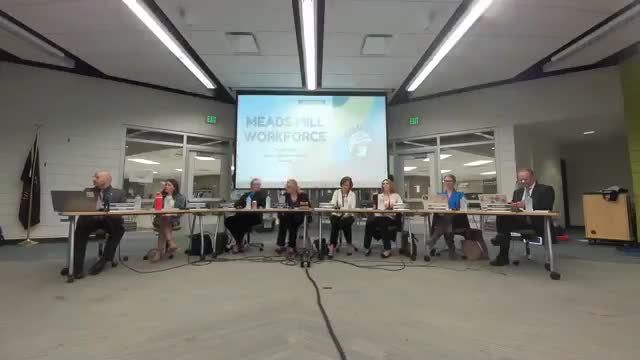Meads Mill middle school expands student 'workforce' program to build responsibility and belonging
Get AI-powered insights, summaries, and transcripts
Subscribe
Summary
Meads Mill presented its student workforce program to the school board, describing jobs for students (morning announcements, computer captain, lost-and-found, dusting) that award 'Patriot' tickets as incentives. School leaders said the program has engaged roughly 80–100 students per quarter and connects to PBIS and MTSS goals.
Meads Mill Middle School staff and students presented the board with details of the school’s student workforce program, a school-run jobs system that places students in paid and weekly roles around the building to build responsibility and belonging.
Principal Melissa Provo and workforce leads Sharon Hall and Amy Soukup described the program’s goals: give students real roles around the school, teach interview and workplace habits, and connect the work to the school’s PBIS (Positive Behavioral Interventions and Supports) system. Soukup told the board the workforce aligns with PBIS tokens called Patriot tickets and helps return value to those rewards.
Student presenters listed common assignments — morning announcements, computer captain, lost-and-found organizer, dusting and desk inspection — and spoke about skills they learned. “Being part of the workforce helped me improve my confidence level when speaking to an audience while doing announcements,” said Zoe Liao, an eighth grader. Students described schedules, team-created routines and the pride of contributing to the school community.
Leads provided quantitative details: the program listed 22 distinct job descriptions; in quarter 3 the workforce hired “over 99” students and in quarter 4 reported between about 80 and 95 students. The program distinguishes between weekly jobs (rewarded in Patriot tickets each week) and quarterly-salaried jobs; presenters described two pay levels in tickets, and staff described classroom- and school-level incentives such as pop-up sales and school store privileges that students can buy with tickets.
Workforce leaders credited PBIS integration with improved behavior and engagement, and offered an example of a student who was struggling academically until hired, after which classroom performance improved within a week. Staff also described entrepreneurial student behavior around saving and trading tickets.
The presentation included logistics and implementation notes: job descriptions, an application and interview process, schedules for duties, and teacher oversight. There was no formal board vote; presenters asked the board to note the program’s progress and continued connection to district goals.
Board members praised the program and asked for opportunities to collaborate on naming jobs and supporting student incentives. School staff said they will continue the workforce next year and coordinate with families and other buildings.
